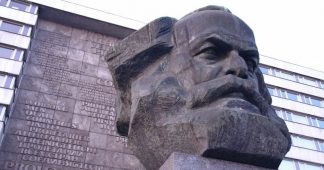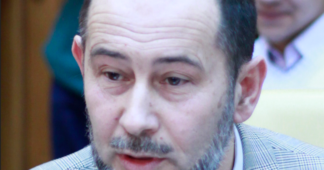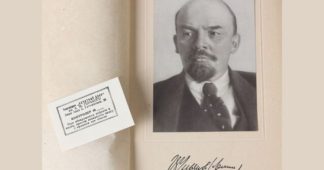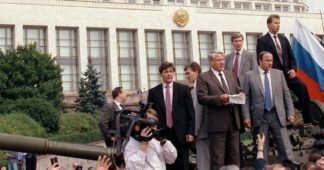by Dimitris Konstantakopoulos
This is the fourth of four articles on Alexandr Buzgalin and his era, the Soviet/Russian tragedy. You can read the three preceding here Aleksandr Buzgalin and his time. The Soviet/Russian tragedy, Do we need Marxism? Marxism and Stalinism, USSR 1989-91: The “democratic counter-revolution” of the nomenklatura.
I would like to close those texts on Alexander Buzgalin and his era, the era of a Russian, Soviet and – after all global – tragedy from which I was unfortunately obliged to omit many important points, with a remark on the issue of the nation and nationalism. Although I often had the chance of discussion with Buzgalin while I lived in Moscow, and even later, I did not follow the details of his political activities very closely. I therefore can give here only a general impression, unable to go into more elaborated detail and with some reserve. I have the impression that if there was a weak point in the action of Aleksandr and his comrades it was a “difficulty” they had on the question of the nation and nationalism, influenced by the classical formulas of Marxism, ideas which I do not consider to be erroneous, but which must be applied in the “concrete analysis of a concrete situation”. They were also certainly influenced by the Soviet ideological rebuttal of nationalism, including great-Russian chauvinism, which is not wrong in principle, but which one must always apply taking into account the specific realities of any given time. What distinguished Lenin’s politics and made the October Revolution possible was that he positioned himself in the face of contradictions as life and society itself presented them and never refused to revise formulas that did not seem to correspond to reality. His actions were undertaken (and corrected) in constant feedback with reality and with evolving social consciousness, without at the same time losing sight of the main, objective and strategic purpose.
To a large extent, moreover, Lenin, Trotsky (the Trotsky of the “Permanent Revolution”) and the October Revolution mark – even if Lenin did not always formulate it clearly, the transition from a 19th century Marxism based above all on a purely European model — that of roughly equivalent European powers, considered as social and economic formations with little regard for their place in the ‘geopolitical hierarchy’ of the world — to a Marxism that takes much more account of the role of imperialism and nations in history. To make the revolution Lenin had to give up the “stage theory” and accept the ideas of Trotsky’s “Permanent Revolution”. Why? Because imperialism made it impossible for countries inferior in scale of development and power to move forward. This was the main reason that made both the Russian and Chinese revolutions necessary and possible and the Menshevik theory of “stages” irrelevant for Russia.
From the very beginning, the Russian (as well as the Chinese) socialist experiment had a geopolitical dimension. The conquest of the social rights of the Russian people presupposed the independence of the country from the imperialist West, and vice versa: the conquest of independence presupposed a people determined to defend it, but to defend it they needed to have something important to defend, not a serfdom. Already in Napoleon’s time, Clausewitz understood that behind the victories of the French was the universal appeal of the triptych of the French Revolution, Liberty, Equality, Fraternity. In the same way, behind the victories of the Red Army in the civil war, against foreign intervention and in World War II, there was the enthusiasm of the Soviet peoples for what they had conquered and the huge global radiance of the ideals of the Russian Revolution.
Although they did not articulate it in detail, a leading contribution of Lenin and Trotsky to the revolutionary politics inspired by Marxism was that they conceived of the ‘class struggle’ as being not only narrowly confined within the framework of the state in which it is waged, but also international, not only as a struggle of the oppressed against the oppressing classes, but also as a struggle of the oppressed against the oppressing nations. From 1921 on, the Communist International has already been reaching out to the peoples of the East, and not exclusively to a West coming late to its supposed “rendez-vous” with revolution and socialism. At that time Lenin will even make an astonishing prediction that victory was inevitable, because the peoples of the periphery are more numerous. That’s exactly what we are witnessing today, with the “collective West” becoming unable to maintain its dominance over all of humanity.
In the case of Russia, we do not have a nation that oppresses other nations and even if it does, this is a secondary aspect of the whole process that started in the late 1980s and which must be seen as a whole, if it is to be understood, both as an attack on the elements of socialism and the welfare state within the USSR and as a geopolitical attack aimed at turning the former Soviet Republics and Russia itself into colonies of the West. The social attack is the other side of the coin of the geopolitical attack and vice versa. If the left is ever to act effectively – in the conditions of a nation, a state, a social formation which is defending itself mainly against the triumphant “unipolar” Imperialism of Western Capitalism, in conditions of the arising hyper-imperialism of the collective West, it defends itself mainly, it is not attacking, in such conditions a really radical Left must combine the defence of society from the oligarchic capitalism with the defence of the nation from Imperialism. What democratic and social rights can the people of a colony claim? And of course vice versa: how effective in the long term is the defence of a country that keeps its society alienated? In order to claim hegemony, in the Gramscian sense of the term, the Left has also to appear as the leading national force, while remaining an internationalist one, a force which knows that the liberation of a people cannot be completed within the single national framework, and that any victories won within it are limited and inevitably temporary; it will then be able to put limits to the evolution of nationalism into chauvinism. (It is the same, of course, the other way around: those who primarily defend their nation cannot be effective in the long run unless they defend their society, which is why traditional nationalism of the ruling classes usually leads, in our time, to failure.)
Certainly Marxism cannot have anything to do with a primitive and reactionary Russian nationalism, which is more suited to anti-communists than to socialism. But this does not imply, far from it, that the Russian Marxist Left should not play a leading role in the struggle to defend the Russian nation against Western imperialism. After all, was it not Lenin himself, the most internationalist along with Trotsky among the Bolsheviks, who began his article in Izvestia in November 1918 with Nekrasov’s stanza on “Mother Russia”:
Thou art so pitiful,
Poor, and so sorrowful,
Yet of great treasure full,
Mighty, all-powerful,
Russia, my Mother! (https://www.marxists.org/
Lenin wrote that article to prevent the people of Petrograd from being discouraged by the decision to move the government to Moscow for security reasons, the fear of the German Armey. If the horizon of the Bolsheviks was the whole of humanity, if they believed that only in such a context did their struggle have meaning, they nevertheless did not forget and they could not forget that their roots and direct field of action were inevitably in the nations of the Russian Empire in which they acted and from which they themselves emerged, the peoples and nations whose historical needs they sought to express.
Of course, it takes a great deal of art and deep thinking and a great deal of dedication to the cause, as well as the ability to move from the general to the specific, if one is to found on the basis of national realities an effective policy that would claim “hegemony”, but would also, eventually, “dialectically” overcome those very same national realities, avoiding both underestimating nationalism and submitting to it.
Aleksandr kept thinking all these matters, giving me the impression that he was struggling with the question of what the correct attitude towards nationalism in general and Russian nationalism in particular should be, a question which caused a lot of quarrels among his friends; he seemed to be asking us foreigners for help and for political-theoretical elaborations on this great question of the relationship between the Nation and the Left. This was both possible and necessary; unfortunately we have not been up to it.
The Western Left
It was likewise unfortunate that, as the USSR was collapsing and “globalization” was rising, most of the European radical left adopted a very hostile attitude towards the phenomenon of the nation in general, without making necessary distinctions, and actually subscribing to the ideology of bourgeois globalization and big, globalized Capital. It is indeed an irony of history that at least some of its currents (as well as what remained of the old pro-Soviet western CPs), following the imperialist line and propaganda, in the period after 1991, very often ended up allying themselves with various totally reactionary nationalisms attached to NATO, imperialism and even fascism. Typical cases are the Croatian, Albanian and Ukrainian nationalisms, which used, not coincidentally, the symbols of the Ustashi, the Albanian allies of fascism and Stepan Bandera. Others saw the dissolution of the Soviet Union, i.e. the most important achievement of the world workers’ movement, as a positive thing. Positions like these caused very strong conflicts among Western Marxist revolutionaries. I remember Pablo (Michael Raptis) describing the role of Mikhail Gorbachev as noxious, in response to a programmatic text for the 4th International by the very great economist, but not so great a politician, I am afraid, Ernest Mandel, who hailed the contribution of the last Soviet leader. An experienced revolutionary, of action and not just of theory, Pablo was sceptical from very early on about the direction perestroika was taking, the way Gorbachev was handling the issue of religion, and he opposed the legalization of multipartism, believing the it should be limited to the parties accepting the Soviet social regime, socialism, and would not aim to restore capitalism.
Aleksandr made a major contribution to the formation of two very large Soviet delegations to two conferences organised by Pablo in Athens. The first was a conference on Lenin in 1990 at the Panteion University of Athens, attended by all trends of the Russian intelligentsia. The second was a conference against Bush’s new world order and the sanctions against Serbia, Iraq, Libya and Cuba, which happened to take place a week after Yeltsin bombed the Russian parliament, with representatives from all tendencies of the opposition to Yeltsin. It symbolised in the best possible way the unity between the struggle against the neo-capitalist and pro-American leadership of Russia and US imperialism, which, taking advantage of the Soviet Union succumbing to the Right, was already showing its teeth in Yugoslavia, the Middle East and North Africa, while still aiming to conquer Cuba.
Aleksandr Buzgalin was a model fighter for democratic socialism and left a powerful legacy for future generations. To conclude this farewell, let me quote the excellent text of the appeal he co-signed with a number of prominent Russian socialist intellectuals on the eve of the 90th anniversary of the October Revolution and which you can read it here
We remind our readers that publication of articles on our site does not mean that we agree with what is written. Our policy is to publish anything which we consider of interest, so as to assist our readers in forming their opinions. Sometimes we even publish articles with which we totally disagree, since we believe it is important for our readers to be informed on as wide a spectrum of views as possible.










